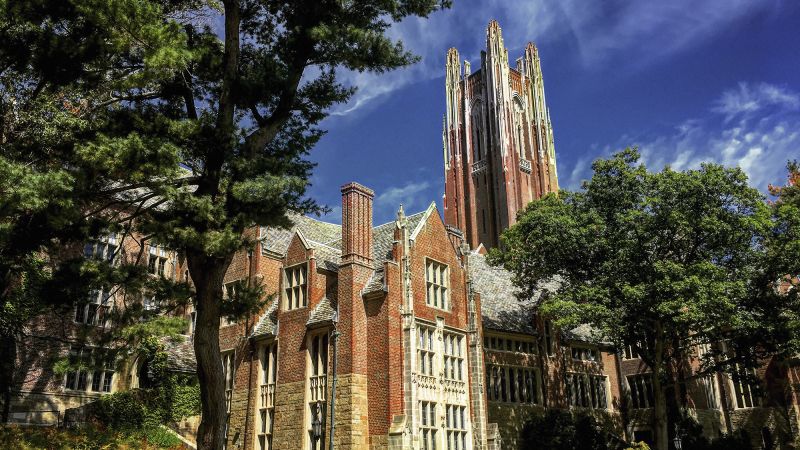A Jewish legal rights advocacy group has alleged that the University of Pennsylvania and Wellesley College have violated federal civil rights law by allowing for discrimination against Jews.
The Brandeis Center, a Jewish civil rights legal organization, filed civil rights complaints with the US Department of Education on Thursday, alleging both schools failed to adequately respond to harassment of Jews.
“These colleges and universities have failed to keep Jewish students safe and are in clear violation of well-established federal civil rights law,” Kenneth Marcus, founder and chairman of the Brandeis Center, said in a statement. “There’s been a lot of talk about rooting out anti-Semitism on campuses, and it’s time to hold these colleges accountable.”
Marcus, a former assistant secretary of education, alleged the universities are “letting Jewish discrimination run rampant” and thanked students for having the “courage” to come forward by sharing their statements in the complaints.
The complaints argue both schools have violated Title VI of the Civil Rights Act of 1964, which protects people from discrimination in programs or activities that receive federal financial assistance.
Neither UPenn nor Wellesley responded to requests for comment.
College campuses have been hit by a spike in tension over last month’s terror attacks against Israel and the ongoing Israel-Hamas war.
The University of Pennsylvania recently alerted the FBI to a series of threatening antisemitic emails sent to the Ivy League school’s staff. Earlier this week, “vile” antisemitic messages were projected onto several University of Pennsylvania campus buildings.
“Penn has allowed its campus to become a hostile environment for its Jewish students as well as a magnet for anti-Semites,” the Brandeis complaint said, referring to the larger community surrounding the university.
The 27-page complaint alleges “Penn’s nurturing of a hostile environment toward Jewish students is a patent violation of” Title VI. It cited the recent antisemitic threats at UPenn as well as the Palestine Writes Festival, a multi-day event on campus at UPenn in September that has been the focal point of a backlash among wealthy donors.
Liz Magill, the school’s president, condemned antisemitism broadly before that festival and noted that some speakers had a history of making antisemitic remarks.
Facing calls for donors for her to step down, Magill announced an action plan on November 1 designed to fight antisemitism at UPenn.
Magill posted an Instagram message on Thursday condemning the antisemitic messages posted on university buildings.
“For generations, too many have masked antisemitism in hostile rhetoric. These reprehensible messages are an assault on our values and cause pain and fear for our Jewish community,” Magill wrote on Instagram. “Projecting hateful messages on our campus is not debate, it is cowardice, and it has no place at Penn.
The Brandeis complaint about Wellesley cited an email that a residential advisor (RA) at a school dormitory sent that allegedly said “there should be no space, no consideration, and no support for Zionism within the Wellesley College community.”
CNN has not independently confirmed that allegation.
Wellesley President Paula Johnson wrote in a message to the college community last month that it recently came to her attention that a “small number of student residence hall leaders from one dormitory sent a letter to their housemates in their capacity as resident assistants that expressed views on the Israel-Hamas conflict.”
Johnson said Wellesley’s student life team met with the students and “talked about their role and responsibility to support all students,” adding that the RAs sent an apology to all students.
The Brandeis complaint argued Wellesley’s “failure to take a stronger stance and check the hostile environment” violates Title VI.
“This is an exceedingly challenging time on college campuses,” Johnson said. “The terrorist attacks by Hamas, the ensuing Israel-Hamas war in Gaza, and the tremendous loss of Israeli and Palestinian civilian lives have inflamed passions and sparked fierce debates around the world that go far beyond the politics and history of the region.”
Johnson previously issued a statement where she condemned the Hamas terror attacks.
The Department of Education sent guidance to colleges and universities this week reminding them about their legal responsibility to protect students from discrimination.
In an interview with CNN’s Rene Marsh, Education Secretary Miguel Cardona acknowledged the agency could withhold federal support, but said that wouldn’t be the first action. Cardona said first the department would provide support and guidance as well as investigate egregious acts.
“Ultimately, if we have to withhold dollars from a campus refusing to comply, we would,” Cardona said.
Meanwhile, the backlash among wealthy donors from some Ivy League schools continues.
Billionaire Henry Swieca recently stepped down from the board of trustee at Columbia Business School, the university confirmed to CNN on Friday. Swieca, a Wall Street veteran, reportedly resigned in protest to how Columbia has responded to antisemitism.
“Columbia Business School received a letter from Henry Swieca on October 30 announcing his resignation from the Board, and the administration thanks him for his service to the School,” a Columbia spokesperson said in a statement.
Swieca did not respond to a request for comment.
Read the full article here













